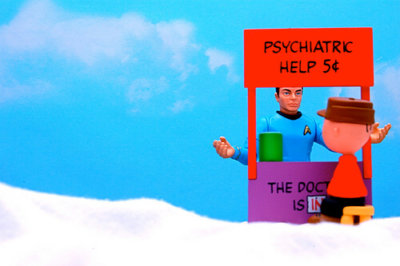Your Guide to Starting Psychological Therapy in the USA

By: Dita Margarita
There are over 500,000 psychological therapy professionals working in the United States today.
So how can you know that the therapist you are considering working with is a good one?
[Live in Britain? Read our piece on “Finding a Good Therapist in the UK“.]
What is a ‘good’ therapist?
It does depend on what you, personally, are looking for from therapy.
But in general, the elements that make up a good therapist include:
- they have suitable training
- they are registered with the appropriate licensing boards
- they are using ethical standards in their work with clients
- the type of therapy they offer suits your issues
- there is rapport between you
- you feel you can grow to trust them.
There is not one element in the above list that is necessarily more important than the other – don’t, for example, assume training is everything.
Although training is obviously important, the therapist with more degrees than any others will be useless to you if the two of you can’t get along. Therapy is at heart a relationship between you and your therapist.
Other things to consider when starting psychological therapy
We all are unique, and we all have our own priorities.
Remember, a good therapist is one that works for you, and that you feel able to openly explore your life and hopes with. So other things you might want to consider can be if:
- they come from the same or similar race/ religion/ background to you
- they experienced similar life experiences
- they are covered by your insurance
- they are a gender you are comfortable with
- you can afford their fees.
The different types of licensed therapists in America

By: JD Hancock
It is entirely possible for a person to be a very helpful counsellor and not be registered (some people, for example, find their church counsellor very helpful). But it is generally deemed safer to work long-term with a psychological therapist who is licensed.
Licensing means a therapist is legally able to use a certain title. The requirements to have a license to offer psychological therapy can vary from state to state, but –
in general, licensed therapists in America are called: psychiatrists, clinical psychologists, counselors, and clinical social workers.
Do not be afraid to ask a therapist directly and clearly about their licensing and training. Remember, you are the one hiring and paying them. You have the right to ask whatever questions you deem necessary.
If you are worried about your therapist’s certification, contact the licensing board of your state and verify if your therapist is indeed listed.
Differences in Training of Each Type of Therapist
Each pathway into being a therapist will have certain educational and training requirements, which can vary slightly by state. But they are generally as follows:
Psychiatrist
After obtaining a medical degree of at least four years, a psychiatrist has finished a residency (another four years) that included psychiatric work. He or she has then passed various exams.
They are given general training in all major talk therapies, and they are the only type of therapist that can prescribe medication.
Doctor of Psychology (PsyD), Ph.D. in Psychology
This means a therapist has finished the highest level of training possible in psychology, usually taking between four and seven years.They then spent years in supervised clinical training and passed many exams.
A PsyD can open their own private therapy practice (you must have a doctorate to do so in America) although some prefer to just work with clients without opening a practice.
The difference between a Ph.D and PSyD is that Ph.D’s usually work in research over with clients, although they too are eligible to open their own private practice.
Licensed Counsellor
Licensed Professional Counsellor (LPC), Mental Health Counsellor (LMHC or MHC), or Licensed Clinical Professional Counsellor (LCPC)
A bachelor’s degree in any subject followed by a master’s degree in counselling (another two years minimum) is the standard in America. A licensed counsellor will also have two years of full-time work under their belt, and have passed a certification exam. They tend to work in clinics, hospitals, courts, and with individuals.
Licensed Family and Marriage Therapists (LMFT)
They will have completed both a master’s degree and an internship placement. And as the name says, they focus on your marriage and your family life.
Social Workers
Licensed Master Social Worker (LMSW), Licensed Clinical Social Worker (LCSW), or Licensed Independent Clinical Social Worker (LICSW), LCSW-R.
Some social workers just take a four-year bachelor’s degree before entering an internship or entry level position in social work.
But to be licensed, they generally have to go on to finish a master’s in social work. After they finish their master’s they will also do a minimum of two years supervised clinical work as well as take a licensing exam.
They work with individuals, couples, and families and are interested in helping others with psychological wellbeing and relationships. They tend to be more affordable than other kinds of therapists. You’ll often find social workers in offices, schools and group settings like rehab centres.
LCSW-Rs have six or more years of experience, and are eligible to be covered by insurance plans.
Licensed Addiction Counsellor (LAC)
They aren’t actually considered ‘therapists’ in America, but they often work alongside others who are therapists. They have usually attained at least a bachelor’s degree, followed by at least a year of training in addictions counselling.
Licensed Creative Arts Therapists (LCAT)
They have taken a master’s degree in art, music, or dance therapy, and have passed the necessary training and exams to be licensed.
Is the therapist really trained in the sort of therapy you want to try?
It’s perfectly legal for a therapist to integrate different types of therapy without necessarily being fully certified in that type.
For example, a psychotherapist who did all their training in a psychodynamic school could integrate elements of CBT therapy without needing a CBT certification to do so.
They might be reasonably proficient in the other type of therapy.
But what this means that if you are interested in a particular type of therapy, you might want to ask if they are actually certified in it, and not just drawing from it.
The Personal Skills that are as Important as Qualifications
The right title alone does not a good therapist make. So what is required then?
A good therapist must have important personal skills that include advanced listening, ethical boundaries, and unconditional positive regard.
Learn all about the personal skills required in a good therapist by signing up to our blog now so you’ll know when we post our connected piece, “The Personal Skills to Look For in a Therapist”.
Have a question about finding a good therapist we didn’t answer? Ask in the public comment box below.





